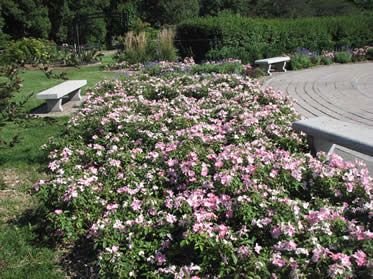Selecting, Planting, and Caring for Shrub Roses
While you may think shrub roses are hardy, these roses are usually hybridized from a cross between hybrid roses and wild roses. Some of the plants are grafted and some are grown off their own rootstock. If there is a bud union it is best to plant the graft 3-4inches below the ground. This way, the plant will grow roots from the buried portion of the canes and will increase the chance of hardiness. Shrub roses can tolerate high temperatures and drought conditions but would rather be consistently moist.
 |
| Shrub Roses are excellent low ground cover, as well as being colorful and appealing. |
Most shrub roses form some size and color of rose hip. This is the fruit of the rose and some can be very ornamental. Rose hips can be used for potpourri, perfumes, and even as food.
Care
Plant all shrub roses in full sun in well-drained soil. The addition of peat moss to a very clay or a very sandy site will aid in drainage and nutrient availability to the plant. Adding an Root Stimulator at planting will help with root growth. Plants should have plenty of space to grow so they will get good air circulation around the plants to decrease incidence of disease. Mulch the plants once the weather warms up to aid in water retention.
Fertilizer
Use an organic fertilizer the first year like Espoma Rose-Tone. This will prevent over fertilizing and the possibility of burning the roots of the plant.After the first year, it is best to use a general rose fertilizer such as Bonide Systemic Rose and Flower Care around the base of each plant in early spring. The amount is variable the smaller the plant, the less you should apply. Water in all fertilizers immediately.
Pruning and Deadheading
Deadheading old blossoms should be done once the flowers begin to fade if the plant is a repeat bloomer. If rose hips are what you want, do not remove the blooms after mid-summer. Eventually, these will turn into the fruit. Yearly pruning should be done in the spring. Cut out any dead or unwanted wood and shape the plant at this time. Never cut more than 1/3 of the plant at one time.Winter Protection
Some plants will experience some die back from the tips of their canes otherwise some will die back to the ground after winter. These plants are considered crown hardy and will not need to be protected. They will grow either from the ground or from where their last bud was the next spring.There are some shrub roses that need some winter protection, a rose cone works well. I would suggest to cover any shrub rose at the base of the plant for the first couple of years to ensure survival the first years as it roots in.
Insects and Disease
Shrub roses are more resistant to insects and disease than their hybrid counterparts. No treatment is needed unless an insect or a fungus is spotted. It is best to space the plants out to decrease the incidence of fungus and make sure the plant is not under any undue stress.Uses
Cut flowers and dried flowers. Rose hips attract birds, add winter interest, and are edible.Shrub Roses Varieties
Explorer Series: Named after famous Canadian Explorers. Many are very hardy if not just crown hardy they may die back and come from the ground every year.Meidiland: Most should have winter protection and the bud graft should be planted 4 in. below ground to increase hardiness.
Morden Series: Grown from their own rootstock and there is no problem if they die back to the ground and come up next spring. Early winter protection is best for young plants.
Pavement Roses: Small rugosa hybrids that have very dense foliage, fragrant blooms, and large rose hips. They are very disease resistant and very cold hardy.
Rugosa Hybrid: Course leaves; large hips adorn these larger plants that have very fragrant, repeat blooms. Theses roses are very cold hardy and disease resistant. If a fungus emerges it is best not to spray fungicides on them, they will burn the foliage.
